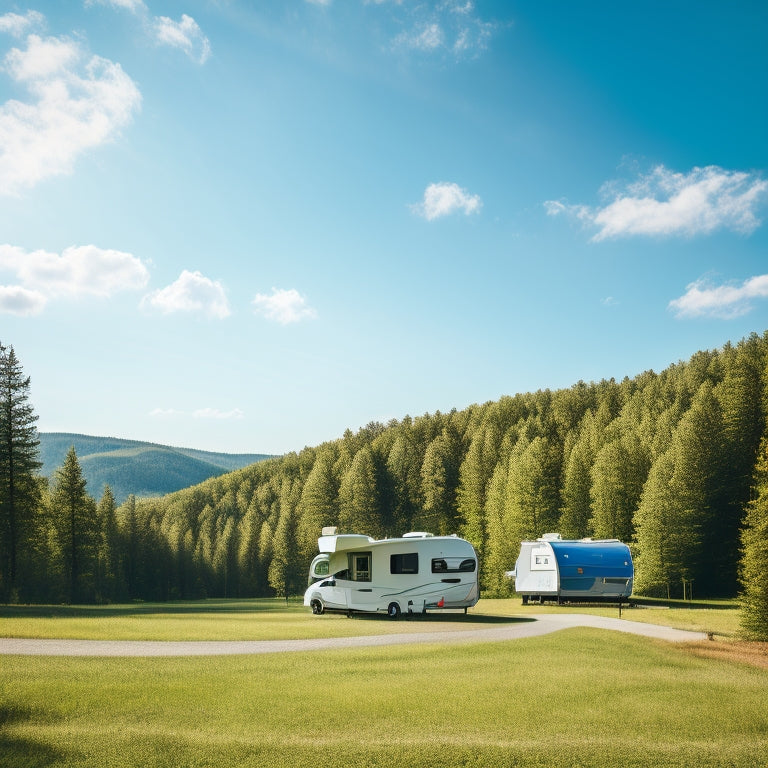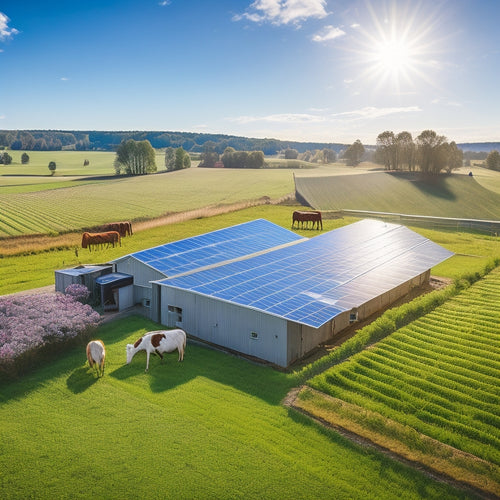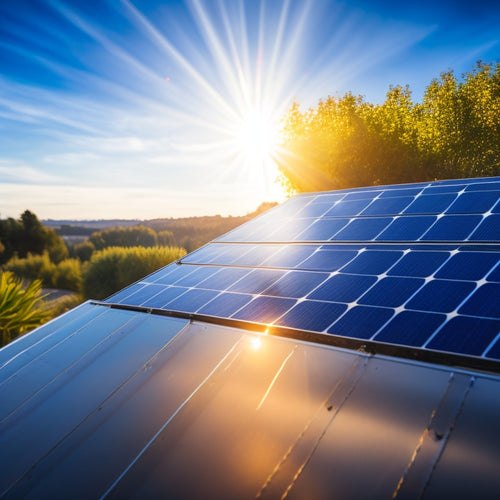
Power Your RV Adventures With Renewable Energy
Share
You're taking an important step towards powering your RV adventures with renewable energy by adopting a sustainable and self-sufficient approach to energy management. To get started, calculate your daily energy needs to determine the required solar panel size and guarantee compatibility with your RV's electrical system. Choose the right solar panels based on efficiency, durability, and compatibility. Next, select an efficient charge controller and the ideal battery bank for your energy storage needs. By optimizing your renewable energy system, you'll be well on your way to maximizing energy harvesting potential and achieving extended periods of energy autonomy. As you explore further, you'll uncover the secrets to a truly sustainable RV lifestyle.
Key Takeaways
• Determine your daily energy needs to size your solar panel system for off-grid adventures, ensuring compatibility with your RV's electrical system.
• Choose efficient solar panels with high energy density, durability, and compatibility, considering features like MPPT technology and overcharging protection.
• Select a suitable battery bank, such as deep-cycle lithium-ion or lead-acid batteries, to efficiently store energy and maximize your renewable energy system's potential.
• Consider smart inverters for grid resilience, uninterrupted energy supply, and optimized energy storage, achieving extended periods of energy autonomy.
• Monitor your system's performance in real-time to reduce energy waste, prolong battery lifespan, and ensure a reliable power supply for your RV adventures.
Harnessing the Power of Solar
As you contemplate starting your RV with renewable energy, begin by calculating your daily energy needs to determine the number of solar panels required to meet your electrical demands. This calculation will help you determine the size of your solar array and guarantee you're generating enough power to support your off-grid lifestyle.
When selecting a solar panel system, it's crucial to take into account Solar Regulations, such as those related to electrical code compliance and safety standards. Additionally, you'll want to make sure your system is compatible with your RV's electrical system and can efficiently charge your batteries.
Choosing the Right Solar Panels
You'll need to take into account several key factors when choosing the right solar panels for your RV, including their efficiency, durability, and compatibility with your electrical system. Panel durability is vital, as it directly affects the panel's lifespan and overall performance. Look for panels with a durable anodized aluminum frame and tempered glass to withstand harsh outdoor conditions.
When comparing brands, consider the following key features:
| Feature | Brand A | Brand B | Brand C |
|---|---|---|---|
| Efficiency | 20% | 22% | 21% |
| Warranty | 25 years | 20 years | 25 years |
| Durability | IP67 rating | IP65 rating | IP67 rating |
In this comparison, Brand A offers a competitive efficiency rate, but falls short on warranty length. Brand B boasts the highest efficiency, but has a lower IP rating. Brand C strikes a balance between efficiency and durability. By weighing these factors, you can make an informed decision that meets your RV's specific needs.
Understanding Charge Controllers
Your charge controller plays an important role in regulating the flow of energy from your solar panels to your RV's battery, ensuring that it's safely and efficiently charged. As you venture into the world of renewable energy, it's crucial to understand how this significant component works.
A high-quality charge controller utilizes MPPT (Maximum Power Point Tracking) Technology, which optimizes energy harvesting from your solar panels. This technology ensures that your battery receives the maximum amount of energy available, even on cloudy or partially shaded days.
When selecting a charge controller, look for one that offers Overcharging Protection, a critical feature that prevents your battery from being damaged due to excessive charging. This safeguard ensures that your battery's lifespan is prolonged, and you can enjoy uninterrupted power on the go.
With a reliable charge controller, you can rest assured that your RV's energy needs are met while keeping your battery safe and healthy. By investing in a high-performance charge controller, you're one step closer to embracing the freedom and flexibility that comes with renewable energy-powered RV adventures.
Selecting the Ideal Battery Bank
With a reliable charge controller in place, it's time to focus on selecting the ideal battery bank that can efficiently store the harvested energy for your RV's power needs.
When choosing the right battery bank, you'll want to take into account factors like capacity, type, and lifespan. A deep cycle battery is ideal for RV applications, as it's designed to handle the repeated charge and discharge cycles.
Look for batteries with a high cycle count, as this indicates their ability to withstand the demands of your RV's power needs.
Take into consideration the depth of discharge (DOD) rating, which indicates how much of the battery's capacity can be safely used before recharging. A higher DOD rating means you can use more of the battery's capacity, reducing the overall size of the bank.
You should also assess the aging cycles of the battery, as this affects its overall lifespan. By selecting a high-quality battery bank that meets your RV's power needs, you'll be able to enjoy reliable, efficient, and sustainable energy on the go.
Efficient Energy Storage Solutions
When it comes to efficient energy storage solutions, lithium-ion batteries have emerged as a top contender for RV applications due to their high energy density, long lifespan, and relatively low self-discharge rate.
As you consider your energy storage options, it's crucial to prioritize efficient solutions that can optimize your RV's energy usage. One key aspect to focus on is grid resilience, which enables your RV's energy system to adapt to changing energy demands and grid fluctuations.
To achieve this, you'll want to integrate smart inverters that can seamlessly switch between grid and off-grid modes. These inverters can detect grid outages and automatically shift to battery power, ensuring uninterrupted energy supply.
By combining lithium-ion batteries with smart inverters, you'll be able to harness the full potential of your renewable energy system, ensuring a reliable and efficient energy supply for your RV adventures.
Wiring and Electrical Safety
As you integrate smart inverters and lithium-ion batteries into your RV's renewable energy system, you must also guarantee that your wiring and electrical connections are safe and efficient to prevent electrical shocks, fires, and system failures. A well-designed wiring system ensures the reliable operation of your renewable energy setup, while also protecting you and your RV from electrical hazards.
Regular electrical inspections are vital to identify potential issues before they become major problems. During these inspections, pay attention to signs of wear and tear, overheating, or corrosion on wires, connectors, and terminals. Make sure that your grounding systems are properly installed and functioning correctly to prevent electrical shocks.
| Component | Inspection Frequency | Potential Issues |
| Inverter Wiring | Every 6 months | Overheating, corrosion, or rodent damage |
| Battery Connections | Every 3 months | Corrosion, loose terminals, or overheating |
| Grounding Systems | Every 12 months | Corrosion, loose connections, or rodent damage |
| Electrical Panels | Every 12 months | Overheating, corrosion, or signs of wear |
Maximizing Energy Harvesting Potential
When you're maximizing energy harvesting potential in your RV, you'll want to focus on optimizing panel angles to capture the most sunlight.
You'll also need to make sure you're using efficient charge controllers that minimize energy losses during the charging process.
Optimize Panel Angles
To maximize your renewable energy system's performance, you'll need to optimize panel angles to guarantee your solar array is harvesting energy at its full potential. Proper panel orientation is essential, as it directly affects the amount of energy your system produces.
For best energy harvesting, you should position your panels at an angle equal to your latitude, minus 15 degrees. This guarantees the panels receive the most direct sunlight throughout the day. However, seasonal adjustments are also necessary to account for the changing sun angles throughout the year.
During summer, when the sun is higher in the sky, you can tilt your panels at a steeper angle to maximize energy production. In winter, when the sun is lower, a shallower angle will allow your panels to capture more energy.
Efficient Charge Controllers
Your RV's solar array relies on efficient charge controllers to maximize energy harvesting potential by guaranteeing that your batteries are charged safely and efficiently, while also preventing overcharging. This is essential, as ineffective charging can lead to reduced battery lifespan and even system failure. Efficient charge controllers ensure that your solar array operates at its peak potential, optimizing energy harvesting and reducing energy waste.
When selecting a charge controller, consider the following key features:
| Feature | Description | Benefit |
|---|---|---|
| Maximum Power Point Tracking (MPPT) | Optimizes energy harvesting by tracking the maximum power point of the solar array | Increased energy yield |
| Load Balancing | Ensures equal charging of multiple batteries | Prolonged battery lifespan |
| Power Optimization | Adjusts charging voltage and current for ideal energy transfer | Reduced energy waste |
| Overcharge Protection | Prevents battery damage from excessive charging | Extended battery lifespan |
| Monitoring Capabilities | Provides real-time system performance data | Informed system maintenance |
Energy Storage Systems
As you explore energy storage systems, you'll find that selecting the right batteries is essential to maximizing your RV's energy harvesting potential, as they directly impact how efficiently you can store and utilize the energy generated by your solar array. When choosing batteries, consider factors like depth of discharge, cycle life, and charging/discharging rates. Deep-cycle batteries, like lithium-ion or lead-acid, are ideal for RVs, as they can handle frequent charging and discharging.
To guarantee grid resiliency and energy autonomy, it's vital to size your battery bank correctly. A larger battery bank provides more energy storage capacity, allowing you to store excess energy generated during the day for later use. This enables you to rely less on grid power and enjoy extended periods of energy autonomy.
Additionally, a well-designed energy storage system can provide backup power during grid outages, ensuring your RV remains powered even when the grid goes down.
Frequently Asked Questions
Can I Use Renewable Energy to Power My Rv's Air Conditioner?
You're wondering if you can ditch fossil fuels and still stay cool on the road. The answer is yes, but it depends on your RV's air conditioner's cooling capacity and energy efficiency, which impacts the required renewable energy output.
How Do I Handle Energy-Hungry Appliances Like Hair Dryers?
When running energy-hungry appliances like hair dryers, you'll want to prioritize energy efficiency. Consider upgrading to low-wattage alternatives or investing in high-efficiency models to minimize energy consumption and reduce strain on your renewable energy system.
Are There Any Renewable Energy Options for RVS With Limited Roof Space?
When you're limited on roof space, consider foldable panels or wing-mounted systems, which provide flexibility and maximize energy harvesting without compromising your RV's real estate, allowing you to harness renewable energy efficiently.
Can I Charge My Rv's Battery While Driving With the Alternator?
While driving, you can charge your RV's battery using the alternator, but consider the alternator's capacity and install dual batteries to optimize charging and prevent overcharging, ensuring a reliable power supply on the go.
Do I Need a Professional to Install My Rv's Renewable Energy System?
'You're not a master electrician, so don't risk frying your RV's electrical system! For a safe, efficient renewable energy setup, it's essential to hire a pro to handle System Design and avoid Warranty Concerns - your RV (and sanity) will thank you.'
Related Posts
-

What Do I Need to Know About Farm Solar Panels
When considering farm solar panels, you need to assess costs, benefits, and technical specifics. Initial investment c...
-

Smart Home Thermostats to Revolutionize Your Space
Smart home thermostats revolutionize your space by providing precise temperature control and optimizing energy saving...
-

How Efficient Are Thin Film Solar Cells
Thin film solar cells provide an innovative approach to energy generation, boasting efficiency rates generally betwee...


